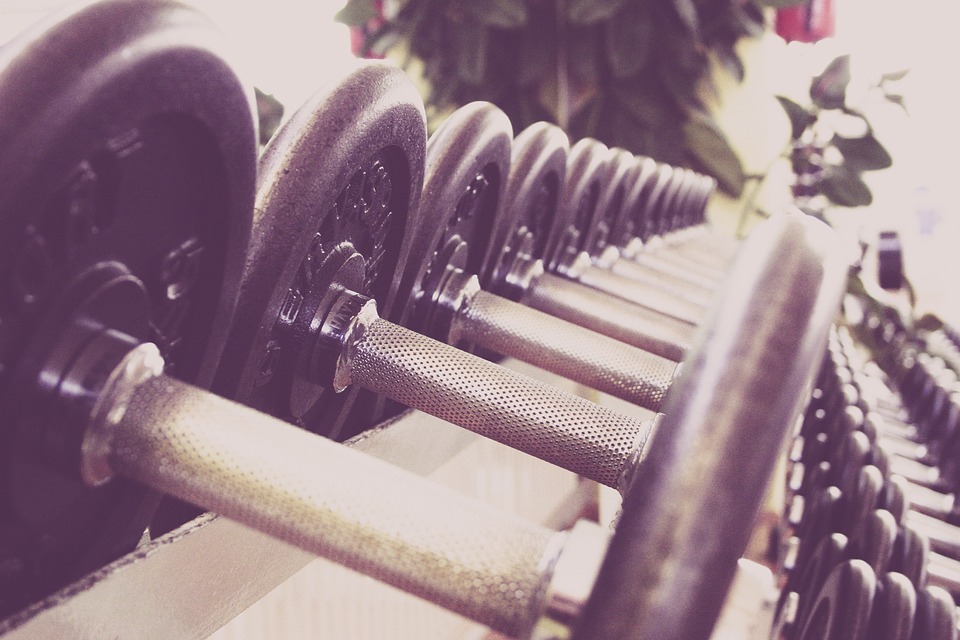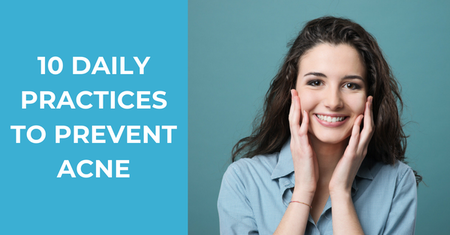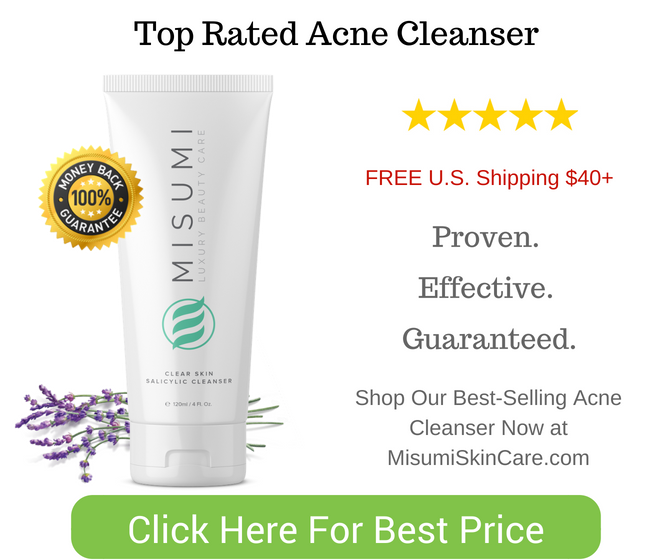Contents
In this article, I will present 10 powerful daily habits that will help you to get clear skin naturally-whether you suffer from teenage acne or adult acne. Some of them might sound trivial, but often ingenuity lies within simplicity.
What a surprise! But relieving your face from dead skin cells, excess oil and other impurities will help to prevent acne.
Things to keep in mind when washing your face:
- Only wash your face twice a day with a mild cleanser – in the morning and at night before going to bed. Overdoing it will only cause your skin to become dry and damage the skin barrier. Thus, acne outbreaks will become more likely.
- Always use a gentle cleanser that includes an acne treatment and avoid harsh products. Cleansers with alcohol can irritate your skin and cause inflammation which is thought to be the primary cause of acne.
- Cleansers containing acne treatments like salicylic acid, glycolic acid or benzoyl peroxide are great acne treatments. They are proven to unclog pores, clean the skin thoroughly and get rid of dead skin cells and the acne that causes bacteria. However, be careful when using benzoyl peroxide as it can bleach fabrics.
- Use warm, not hot water to wash your face and dry it gently with a clean and soft towel
- No rubbing, just dabbing!
- If you wear makeup, you may need to cleanse twice.
Here you can find a thorough review of one of our favorite skin cleansers – perfectly suited to sensitive skin!
A composition of healthy foods good for acne
Dairy products and foods with high processed sugar may cause acne, so stay away from them and get your fair share of fresh fruits and veggies. Besides preventing acne, they will fuel up your vitamin and mineral levels and enhance your overall health and energy!
Even though there is no hard scientific evidence, that certain types of food directly cause and worsen acne. More than one-third of people with acne see a direct relationship with their meals and acne outbreaks. Missing evidence is most likely due to the lack of scientific studies and the complexity of the issue. Our nutrition interacts in a myriad of ways with our body and neither of them is one dimensional. Our skin needs vitamins and nutrients to repair and recover, a bad diet will slow down this process. Your diet also directly influences your hormone household which in turn is known to be directly linked to acne. Therefore, changing up your diet may be the only acne treatment you need.
More recent studies suggest, that a low-glycaemic diet may help to reduce or prevent acne. In western societies, we are used to high-glycaemic diets because of all the processed food and artificial sugars we consume. This causes the body to produce large amounts of insulin and exhibit insulin resistance, which is linked to a change in sebum production and therefore inflammation and acne. Fresh vegetables, fruits, and less processed sugar will prevent that.
What should you try to avoid?
In general, you should try to have a balanced diet and get all the necessary vitamins, minerals, proteins and fats that your body needs. It will significantly influence the way your body fights and prevents acne and also boosts your overall health. Move on from our high-glycaemic western diet that is thought to cause inflammatory acne and avoid the following foods:
- High-glycaemic foods (white bread, processed breakfast cereals, deep frozen pizza, potato chips, cookies, cakes, and other processed foods)
- Cow milk
- Low-quality fats like in butter, fatty meat
- Fast foods
Running is great to boost your blood circulation and recharge your skin cells.

Regular exercise will be good for your whole body as well, It also lets the blood circle through your body which provides the skin with oxygen and nutrients and carries away they waste – detox and refuel!it boosts your metabolism and decreases stress hormones that can also trigger acne.
BENEFITS
- Decreases stress hormones
- Supplies skin with oxygen and nutrients
- Boosts metabolism
- Detoxifies the skin
- Can lead to clearer skin
KEEP IN MIND
- Avoid clothing that irritates your skin
- Shower right after (sweating during exercise doesn’t make your acne worse, it only happens if you leave it on the skin)
- Always use a clean and soft towel
- If you work outside don’t forget your acne suited sunscreen (link: sunscreens for acne prone skin)
We just love to touch our face but…
I know it’s hard but think about all those places your hands have been during the day, you don’t want all this dirt and bacteria on your face. This will likely clog pores and make an acne outbreak more likely. Even worse, in areas where the natural barrier of the skin is compromised, it can lead to infections and severe acne.
If you are a picker, things become even more dangerous. Bacteria that are naturally present on the skin, as well as those gathering on your hands, are likely to penetrate to a deeper level, leading to a breakout or causing an infection of an existing pimple which can lead to cystic acne. Not to mention that popping pimples can lead to severe scarring!
Instead of picking at your skin, apply an acne treatment to the affected areas and let it do its work.
Your hair is likely to transfer hair products to your skin
What’s good for your hair is not necessarily good for your skin as well. Oils, gels, hair sprays or any other products are likely to end up in your face at some point- which can then lead to acne breakouts. If you don’t want to stop using your favorite hair product, try to evaluate if it affects your acne. Areas that tend to be primarily affected by outbreaks are the neck, upper back, forehead, and hairline.
Which ingredients to watch out for?
- Petroleum
- Silicone
- Cocoa butter
- Sodium lauryl sulfate
- Ammonium lauryl sulfate
- Mineral oils
- Lanolin
- Alcohol
What can you do against it?
-
- Ideally wash your hair before going to bed and rinse out hair products, otherwise, they’re likely to end up on your pillow and then in your face
- Use gentle and dermatologically tested hair products
- Keep your hair away from the areas where you are prone to have acne.
- If you have oily hair, wash it as needed and keep it away from your face.
Oily skin doesn’t mean its moisturized!
Acne products are prone to cause skin dryness and irritation. Dryness signals the body to produce more oil in affected areas and this can lead to further bacterial growth and acne. Prevent it by using a moisturizer!
Acne products that can cause dry skin:
- Benzoyl peroxide
- Salicylic acid
- Adapalene, tazarotene, or tretinoin
- Isotretinoin (prescription treatment)
- Essential oil in high concentration (e.g. Tea Tree Oil)
Which moisturizer to choose:

- Oil-free
- Non-comedogenic- non comedogenic means it doesn’t block pores and thus is not likely to cause acne
- Products tested for acne
Moisturising regularly can also improve the appearance of acne scars- so keep that skin hydrated.
Always use an acne suited sunscreen
A common misconception is that sunlight can cure acne. But sunlight can make your breakouts worse. The sun’s harmful rays can cause inflammation and redness, as well as cause dark discolorations in acne affected areas called hyperpigmentation. They can also cause skin cancer.
Additionally, many products against acne make the skin more sensitive to sunlight, so that a sunburn can already occur only after minutes in the sun. Always check the product description for warnings! I recommend minimizing time in the sun when its strongest (11-15) and always use a “non-comedogenic” sunscreen to minimize the risk of outbreaks and prevent sunburn! Wearing a hat or cap also helps to keep the sun out of your face.
The risks associated with sun exposure
- Increased inflammation and redness
- Dehydration that can cause increased sebum production
- Hyperpigmentation
- Sunburn
In conclusion: wear sunscreen!
Sleeping is good for your body, your soul and your skin!
It is no secret that sleep is very important for your body and psyche! A regular and consistent sleep pattern of 6 to 8 hours is great medicine for your whole body including acne.
During sleep, your body recovers and reduces stress hormones and heals all those little problems that sum up throughout the day – if there’s no time for it, it won’t happen!
Research finds that a lack of sleep or also an irregular sleep pattern will promote stress, increases insulin resistance and doesn’t give the body enough time to recover. It is also thought to increase sebum production due to increased cortisol release. So if you have acne prone skin, make sure you’re getting enough hours.
Benefits of enough sleep for acne
- Skin recovers
- Time to heal
- Reduce stress hormones that are linked to acne
Risks of sleep deprivation
-
- High levels of stress hormones
- Increased insulin resistance (higher blood sugar)
- Likely to increase sebum production (high level of cortisol)
- No time to recover, repair and heal
- Metabolic dysregulation

Keeping it clean, will make a difference!
You wouldn’t go five days without washing your face, would you? But we bet you don’t blink an eye sleeping on the same pillowcase for weeks. Sleeping on dirty pillows can be quite counterproductive if you’re trying to combat breakouts!
Pillowcases can house a plethora of bacteria or germs and if not changed often, can lead to skin irritation and may worsen acne. All the excess oil on your face, along with any product in your hair are left on the fabric and transferred back onto your skin. This n turn will clog pores.
Experts suggest laundering pillowcases after just three nights to keep acne at bay, especially if you are prone to breakouts. Also look for a gentle washing deterrent without any potentially harmful ingredients. While the material of your pillowcase won’t necessarily cause irritation, it’s thought that natural fabrics may be best.
Make it a habit to not only launder your pillowcases often but to wash your face and hair before laying down for the night. An unwashed face and hair not only transfer oil and germs onto your bedding but also lead to more clogged pores.
BONUS TIP:
Try using a specialty pillowcase made out of silk and other antimicrobial fabrics to help your skin heal while you rest. These pillowcases are made to reduce friction and the spread of bacteria while you sleep, and they don’t irritate skin. Plus, they’re super chic. It’s a win-win!
64 % of your skin is composed of water, thus dehydration will have a significant impact on your skin and also your whole body!
Drinking plenty of water seems to be a cure-all for a myriad of problems. This is especially true in the case of acne.
Dehydration can lead to inflammation, itchiness, excess oil production or increased skin sensitivity.
While alone drinking water won’t completely rid you of pimples, research suggests that staying hydrated will flush out toxins and help your skin function better. It’s for this reason; water should absolutely be in your arsenal against acne.
What other methods of preventing acne have you tried? What were the most successful ones? Share your story with us in the comments below!



